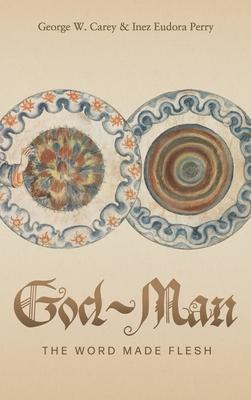God-Man: The Word Made Flesh (1920) is a book of mysticism exploring how the allegories of scripture relate to the truths of the cosmos and the human body. Within many of the Biblical parables, George W. Carey and Inez Eudora Perry find that many of the people described were in fact personifications of the wisdom needed to reach spiritual enlightenment.
George Washington Carey (1845-1924) and Inez Eudora Perry (1871-1961) were collaborators on topics of astrology, homeopathy, and biochemistry. Combining Christianity, ancient religions, physiology, anatomy, and more, Dr. Carey and Ms. Perry sought the answers to the nature of humanity and God.
One of the pair's lasting contributions was to the field of biochemistry. Influenced by Dr. Wilhelm Heinrich Sch ler who identified cell-salts-naturally occurring minerals that could supplement deficiencies in the human body-Dr. Carey went further, associating the signs of the zodiac to a natural deficiency in these minerals. Through careful supplementation, he believed that one could cure a host of physical and psychological ailments.
Astrologer Inez Eudora Perry was an adherent to Dr. Carey's ideas. The pair wrote several works together, including The Tree of Life and Relation of the Mineral Salts of the Body to the Signs of the Zodiac. In 1923, Dr. Carey made Ms. Perry a partner in his biochemical foundation, which was renamed The Carey-Perry School of The Chemistry of Life.
God-Man: The Word Made Flesh explores the allegory within scripture. Rather than taking each parable as literal truth, their interpretation draws on knowledge of the human body, astrology, world religions, and symbolism to find the real meaning behind the Biblical text.
In the story of Sara and Abram, for example, they explain that rather than a literal story in which a 90-year-old woman (Sara) and 100-year-old man (Abram) give birth to a son (Isaac), their real "child" is happiness-the meaning of the word Isaac in Hebrew. The true lesson is that "...age imposes no limit or barrier to the birth of the 'Incorruptible Seed' (Peter) for it is eternal life."
"Abraham, Isaac, Jacob, Noah, David, Solomon, Isaiah, etc., etc., are not historical characters," he writes. Nor are Pontius Pilate, Pharaoh, or Herod, which are names of offices or functions rather than individuals. Through exploring the meanings of these names, down to the letters that create them in the original Hebrew, the writers find new truth in the stories that have been misinterpreted for so long.
At the center of this truth is the idea that the parables in the Bible were meant to describe the human body as a microcosm of the universe. But at the council of Nicea, it was voted that "...the symbols of the human body were persons; that Jesus was a certain historical man, a contention utterly and indubitably without foundation, in fact, and that all who believed (?) the story would be saved and forgiven here and now." From this vote, the true meaning of the scriptures was hidden from us, preventing us from reaching our highest physical and spiritual wellness.
Further complicating these misunderstandings are the myriad translations of the Biblical text. By revisiting and retranslating the original Greek and Hebrew, the authors seek to return to the original meaning of the words rather than relying on another's interpretation of them.
For the seeker of truth and the student of mysticism, God-Man: The Word Made Flesh is a valuable contribution to your studies.
